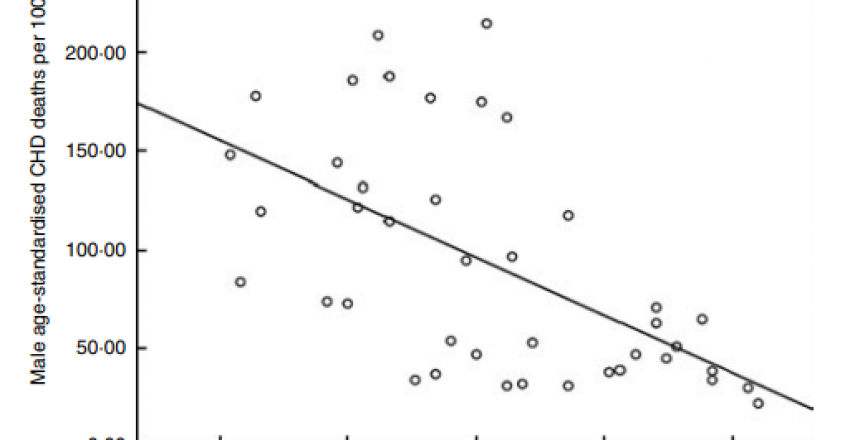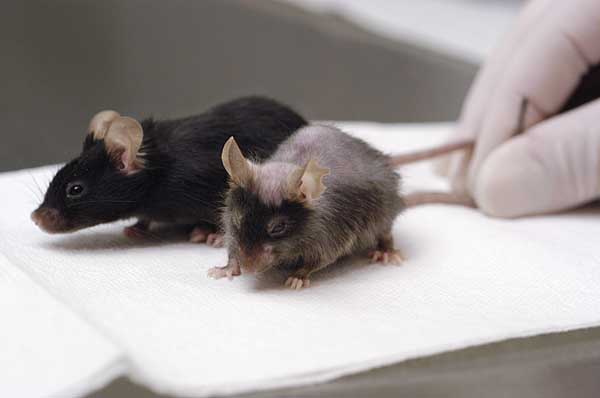Mainstream health authorities have told us for decades that we should eat less meat, and replace it with carbohydrates, but are they right? Let’s take a look at the relation between meat, saturated fat, and long life.
Countries that eat meat, and those that don’t
Meat consumption varies tremendously by country.
Hong Kong
The country with the world’s highest meat consumption appears to be Hong Kong, according to the National Geographic. (Although Hong Kong isn’t a self-governing nation, but an administrative district.)
From National Geographic:
Hong Kong consumes more meat per person – both calorically and in weight – than any other nation. At 695 grams per day, people in Hong Kong eat 60% more meat than the next-highest meat eaters in New Zealand.
Hong Kong is also number three in the world in per capita beef consumption, so their meat isn’t just chicken or seafood.
Together with China and Macao, Hong Kong is fourth in the world in per capita pork consumption.
If our health authorities are right, then people in Hong Kong should be dropping like flies from heart disease and cancer.
But they’re not.
The WHO lists Japan as having the world’s highest life expectancy, at 83.7 years. But as noted, since Hong Kong is not a country, it doesn’t appear on their list.
But Hong Kong now has a life expectancy of 84.3 years – 81.3 for men, and 87.3 for women. It appears to be the world’s highest.
India
India has the second lowest per capita meat consumption in the world. The only country lower for which there’s data is Bangladesh.
Yet cardiovascular diseases are epidemic in India. They accounted for 32% of adult deaths from 2010 to 2013. The figure for the U.S. is 23.4%.
India has a life expectancy of 68.3 years.
Now, there are obviously lots of differences between countries like Hong Kong and India, mainly wealth and poverty, which leads to widely differing standards of medical care.
But if meat were the cause of cardiovascular disease, it seems unlikely that India would have a high rate, while Hong Kong has the world’s longest life expectancy.
India should have a low rate of cardiovascular disease, given its low meat consumption.
What could be causing high CVD rates in India? In addition to higher rates of smoking (22% among Indian men, compared to about 17% in U.S. men):
The epidemic of sedentariness has penetrated rural households with rapidly increasing use of labor-saving technologies. Dietary habits have undergone a see change with greater consumption of fats, saturated fats, trans fats, and processed foods. Calorie-dense fast foods (comfort foods) are easily available and both Indian-style and Western-style fast foods are being consumed widely. (Source.)
So, less physical activity might be one cause.
But also, greater consumption of processed foods, high in sugar, seed oils, and refined carbohydrates.
None of these have anything to do with meat consumption, which is low in India.
This is some evidence for my contention that the main causes of cardiovascular disease are cigarettes, seed oils, and sugar. Not meat or saturated fat.
In addition, carbohydrates are associated with cardiovascular disease, and saturated fat is not.
France has the highest consumption of saturated fat, and has the lowest rate of cardiovascular disease. Switzerland has the second highest consumption of saturated fat, and has the second lowest CVD mortality.
Switzerland also has the second highest life expectancy of any country. France stands at number 7.
The PURE study, which tracked data from countries that spanned a great range of income, including India and Pakistan, as well as countries like Canada and Sweden (high income) and Poland and Turkey (middle income), found the results presented below.

The more saturated fat people ate, the lower their rates of CVD and the lower their total mortality. The more carbohydrates they ate, the higher their rates of CVD and total mortality.
In Europe alone, the situation with regard to saturated fat and CVD death rates is as follows (source):

The more saturated fat that Europeans ate, the lower their rate of cardiovascular death.
Another European study found that total animal fat and protein intake were highly and negatively correlated to cardiovascular mortality. (Source.)

Conclusion
Saturated fat consumption is not associated with increased cardiovascular disease rates or death rates, but lower rates.
Hong Kong has the world’s highest meat consumption, and the highest life expectancy. The people of India eat little meat, and have a high rate of cardiovascular disease.
While the evidence presented above is illustrative or associational only, and not 100% conclusive, it pokes a serious hole in the mainstream “plant-based” dogma that meat is unhealthy.
Meat is in fact healthy, as is saturated fat.
The real dietary culprits of our current epidemic of bad health and obesity are seed oils, sugar, and refined carbohydrates.
Why don’t scientists and doctors see this?
Perhaps they do see it, but don’t change their opinions or practices because:
- Money: statins are a multi-billion dollar business, and doctors have been trained to prescribe them. Lowering cholesterol has become the focal point for much of modern medicine.
- Saving face: they’ve preached the benefits of low-fat, low-meat, and high carbohydrate diets for decades now, and to admit they’re wrong would mean losing face, and prestige.














24 Comments
A 3rd possible reason may be that the evidence is not conclusive (at least to my view) and there seems to be logical arguments and studies on both sides. For example, Nutritionfacts.org often cites quality studies to support the less meat / saturated fat argument. I can post a pointer later if I find something more specific.
An even more pertinent question is whether we are correctly categorizing fats – based on bonds – in the way that accurately assesses their health effects.
I think not.
I think we have missed that the fat soluble vitamins in these fats are important, vulnerable to processing (e.g. so-called man-made trans fats represent an altered form of vitamin K called dihyrophylloquinone which does not act as real vitamin K), and that we have inadvertently made for many bad health effects by creating novel substitutes for those falsely maligned ‘saturated fats.’ Examples of such are man-made emulsifiers, novel dietary fats, stabilizers.
All the data does conclusively is demolish most contentions of most vegans.
Here’s a few pointers I recently came across about saturated fat / meat reviews/studies.
My intent here is not to outright challenge data referenced in this article and comments. I appreciate P.D.’s articles and, for whatever it’s worth, I’m a meat-eater. What I am trying to do is be a seeker of truth, present conflicting datapoints that I’ve seen and haven’t made sense of, and hopefully stimulate a civil and rational discussion along the merits of these various datapoints.
https://nutritionfacts.org/video/lipotoxicity-how-saturated-fat-raises-blood-sugar/
https://nutritionfacts.org/video/is-organic-meat-less-carcinogenic
Perlmutter blog (but don’t have pointer to referenced study/report)
***
A report in the journal Cell Metabolism related consumption of higher levels of protein from animal sources to increased mortality risk. Interestingly, the same report also revealed that lower levels of protein consumption in elderly people might increase the risk for various health issues. The authors concluded:
‘These results suggest that low protein intake during middle age followed by moderate to high protein consumption in old adults may optimize healthspan and longevity.’
The study followed 6,381 adults over an 18 year period and collected data revealing what foods were consumed as well as any specific health issues that developed.
Overall, I think the study does provide some very valuable information and points to meat consumption as an important area to focus our attention in terms of how our food choices affect our health.
As I’ve blogged about before, more than 90% of the meat consumed in America is grain-fed. This matters significantly. Grain-fed animals produce meat and dairy products higher in dangerous, inflammation-producing omega-6 fats, while they are deficient in healthful, heart-protective, immune-enhancing, brain-friendly omega-3s. And it’s these alterations in fat ratios that relate to the very health issues we fear most including coronary artery disease, cancer, diabetes and Alzheimer’s.
To summarize, this study fails to reflect the health benefits of choosing grass-fed meat products from organically raised animals, which is a very important consideration.
***
Greger points at a lot of things that blame meat. The problem is that the metabolism for burning carbs and burning saturated fat conflict. If we primarily burn fat for energy and then add carbs it has negative health effects once that conflict reaches a certain level. The same goes for a carb burner eating SFA. This is where vegans get their data from… easy to blame meat when really meat w/o seed oils and carbohydrate is absolutely NOT the problem.
Money is the main reason the mainstream advice never seems to change, but it goes way beyond statins and other drugs. There is obviously a LOT of money to be made selling refined/processed food products to consumers. Kids are bombarded with ads for all this junk food from the time they are just a few years old, so most parents buy it to keep them happy. The big food companies spend a lot of time and effort developing processed foods that are highly addictive (chips and sugary snacks are just a couple examples). About 3/4 of the grocery store is full of all that disease-causing stuff, so most people just assume that all this processed stuff is safe to eat (if they think about it at all). There is not much money to be made selling whole foods to consumers. Have you ever seen a tv ad for vegetables? Nothing will change until a lot more people wise up and realize this stuff is killing us, and start eating more whole foods. There is little evidence that that will happen anytime soon.
Rob, I’m in complete agreement. It’s funny how the vegans bring out the canard of “meat industry” payoffs and studies. The meat industry doesn’t generate profits like Coca-Cola or General Mills, not even close.
The incentive for low food prices is not restricted to the food industry (which just profits from the difference of cost vs. sales price).
Every single other industry can only profit from money consumers can spend only after spending their money for food.
Driving down food prices is as beneficial for the profits of the rich as well as for the standard of living of the poor and everybody in-between.
Governments should attempt to drive down food prices, so that consumers can buy products and services not connected to food, therefore driving the economy, increasing tax revenue and rising the level of prosperity for everybody, decreasing unemployment etc.
Everybody wants cheap food for personal profit motives.
For maximization of calories per dollar that means, with current technology, seed oils and carbohydrates, directly from the plants.
Animal farming can only increase the cost per calorie, as primary plant calories are lost by converting plant material into meat.
Also, protein is the most valuable, most scarce, most expensive macronutrient.
Therefore, it’s no wonder how the actual consumption as well as governmental recommendations look like.
If billions of humans would recognize the health-related importance of avoiding simple carbs and seed oils as well as starting to desire eating eggs, fish, meats and diary, average food prices of the latter should explode, because demand would greatly exceed supply.
Even now our oceans are over-fished.
If hundreds of millions, or even billions of people suddenly wanted to get their fill of animal protein, meats, eggs, diary and fish, prices would explode to levels even the middle class would not easily be able to pay.
If I am not wrong (and I may well be), than it could not be in our self-interest to too widely disseminate the evidence that people hurt themselves by eating cheap carbs and seed oils.
I, for my part, am very comfortable with low prices for meat, diary, fish and eggs.
If not everybody can have it, I want to be among those who can.
While I agree meat isn’t unhealthy and may have health benefits, I would note that Switzerland and Hong Kong are among the richest places in the world while India one if the poorest and that this is probably what accounts for the differences in lifespan.
No doubt it’s important, as I noted in my article.
Even if we assumed that meat was bad for health, income swamps the effects.
Maybe doctors should be telling people to make more money instead of telling people not to eat meat.
Poverty, smoking, stress and sedentary lifestyle can reduce the benefits of a plant based whole food diet but far more comprehensive studies such as the Nurses Health Study and Cornell have shown positive correlations between heart issues and cancer and meat and dairy consumption.
Yes, but as far as heart disease is concerned we are told that little meat and animal fat will prevent heart disease..
Doesn’t seem so..
Re: the PURE study. How do you square the fact that PUFAs seem to be healthier to consume in large quantities than MUFAs and SFAs with your continuous argument that seed oils (which are the main sources of PUFAs) are disease-causing pro-inflammatory foods?
Not sure. Could be due to fish or nut consumption. Whatever the reason, it’s clear that increased omega-6 is detrimental, increased omega-3 beneficial. Some seed oils contribute a greater portion of omega-3 than others and therefore could be beneficial in people who have low omega-3 intake.
DK, what is the evidence that PUFAs are healthier? If it is coming from the PURE study, that was an observational study so healthy-user affect could be at play. As Chris Masterjohn and others have discussed, other studies have shown PUFAs to be a problem, especially on the cancer front. If they are coming from fish, then there are offsetting factors. Heated seed oils are especially bad so if healthy users are getting their PUFAs from something other than fried food, then that is somewhat less unhealthy. SFAs and MUFAs also tend to come as part of other foods that have a very healthy nutrient profile (like egg yolks and avocados) however very few healthy users following mainstream advice would be eating those foods, so that would likely skew any observational study, as has been widely discussed elsewhere.
The findings of the PURE study have been widely misinterpreted. This is from a review of the PURE study done by Harvard Univ. School of Public Health:
” As the authors acknowledged, the study did not assess trans fat intake (which is particularly high in South Asia [3]), which may have confounded associations for other types of fat. The PURE study found that substituting saturated fat for carbohydrates did not lower mortality risk, but substituting polyunsaturated fat for carbohydrates was associated with lower mortality. Interestingly, the study did not examine the effects of substituting polyunsaturated fat for saturated fat. Randomized clinical trials have found that while replacing saturated fat with carbohydrates had no effect, swapping saturated fat with polyunsaturated fat significantly reduced the risk of cardiovascular disease. [4]”
[3] Butt MS, Sultan MT. Levels of trans fats in diets consumed in developing economies. J AOAC Int. 2009;92:1277-1283
[4] Hooper L, Martin N, Abdelhamid A, Davey Smith G. Reduction in saturated fat intake for cardiovascular disease. The Cochrane database of systematic reviews. 2015:CD011737
The PURE study has been widely misinterpreted. The Harvard Univ. School of Public Health reviewed it, and this is from their review:
“As the authors acknowledged, the study did not assess trans fat intake (which is particularly high in South Asia [3]), which may have confounded associations for other types of fat. The PURE study found that substituting saturated fat for carbohydrates did not lower mortality risk, but substituting polyunsaturated fat for carbohydrates was associated with lower mortality. Interestingly, the study did not examine the effects of substituting polyunsaturated fat for saturated fat. Randomized clinical trials have found that while replacing saturated fat with carbohydrates had no effect, swapping saturated fat with polyunsaturated fat significantly reduced the risk of cardiovascular disease. [4]”
[3] Butt MS, Sultan MT. Levels of trans fats in diets consumed in developing economies. J AOAC Int. 2009;92:1277-1283
[4] Hooper L, Martin N, Abdelhamid A, Davey Smith G. Reduction in saturated fat intake for cardiovascular disease. The Cochrane database of systematic reviews. 2015:CD011737
I like this overview. Eliminates my guilt feelings about eating meat.
Can you do something similar for meat and cancer?
Thanks, Isaac. Good idea, I should do that.
Makes me wonder why they are not listed as a “Blue Zone”.
But then again, I don’t wonder. We all know why…
Because blue zones is a term coined by author Dan Buettner specifically for the five regions he observed. Nobody added after that.
Good info. The problem is, saturated fat intake goes up in tandem with PUFA and MUFA consumption, at least when considering large populations. So it is as likely, more so IMO, that it the higher PUFA or MUFA consumption that is beneficial
Epidemiological studies prove nothing.
Eat what you want IN MODERATION and enjoy life. Like most info we’ve been fed over the decades, it’s all: he said; she said; I heard; I think; I believe; etc. most of it has been knee jerk ‘research’ . God will determine when you die. The quality of your life ids based on avoiding excess in anything. Moderation and sensibility. I’ll have my ribeye medium rare!